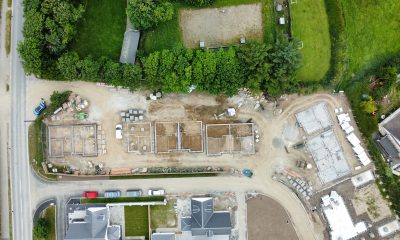Farming
Huge turnout in Carmarthen as Welsh farmers protest government reforms

APPROXIMATELY 3,000 Welsh farmers and their supporters converged at the Carmarthen showground in Nantyci this week (Feb 8), voicing their stern opposition against the planned reforms by the Welsh Government.
This significant gathering followed a similarly packed meeting in Welshpool last week, which saw over 1,000 attendees.
The protests have been ignited by the Welsh Government’s proposed changes to farming policies, aimed at encouraging “sustainable” agricultural practices. Under the new subsidy scheme, set to be implemented from 2025, farms would need to dedicate 10% of their land to tree planting and another 10% to wildlife habitats to qualify for payments. These measures are part of a broader effort to combat climate change and biodiversity loss.
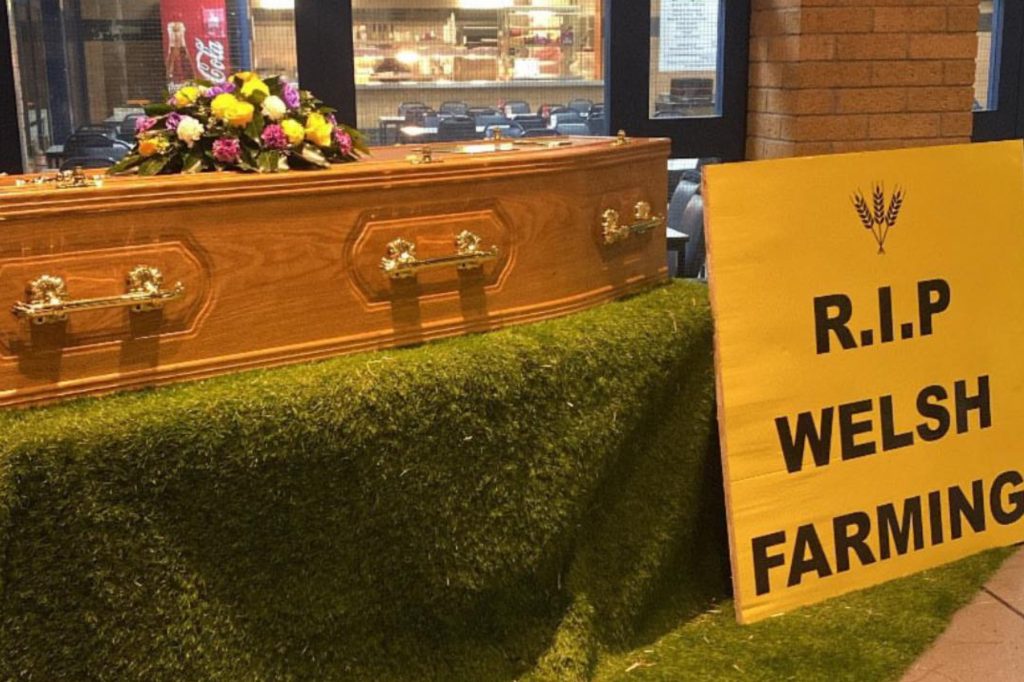
However, the reforms have been met with widespread criticism from the farming community.
A mock coffin, bearing the inscription “In memory of Welsh farming,” was paraded by protestors at the demonstration, symbolising the perceived threat to the industry. Signs with messages like “RIP Welsh farming” and “no farmers, no food” were also prominently displayed, underscoring the deep concerns within the agricultural sector.
The Welsh Government has urged farmers to engage in the ongoing consultation process regarding the reforms, suggesting that changes to the plans could still be made. Despite this, the sentiment on the ground reflects a profound fear of the future, with many farmers feeling the new requirements would impose unmanageable burdens and significantly increase administrative work.
The farming industry’s leaders have not minced words, describing the current moment as a “crunch point” for Welsh agriculture. They argue that the scheme’s rigid requirements on tree and habitat creation, coupled with the lack of clear details on payment rates, will have disastrous effects on farm businesses. An impact assessment accompanying the consultation predicted a substantial reduction in livestock numbers and a potential loss of 5,500 jobs, further exacerbating the industry’s anxieties.
In response to the mounting pressure, the Welsh Government, represented by Rural Affairs Minister Lesley Griffiths, has acknowledged the sector’s concerns, emphasising the importance of the consultation process and suggesting that adjustments to the proposals are likely. The government insists that the Sustainable Farming Scheme (SFS) aims to ensure the long-term viability of Welsh farming, alongside environmental sustainability.
Nevertheless, the farming community remains skeptical. The current and final consultation period represents a critical juncture for Welsh farmers to express their concerns and potentially influence the future direction of agricultural policy in Wales. With a history of farming that runs deep in the Welsh countryside, the outcome of this dispute will undoubtedly have far-reaching implications for the region’s rural economy and way of life.
Samuel Kurtz MS, said on X: “Immensely proud and in awe of every farmer at Carmarthen Mart tonight. The sleeping dragon that is rural Wales is awakening after years of neglect by Labour.
“Fed up, frustrated but not taking a backward step.”
The Welsh Conservatives say that the Labour Government does not listen to Welsh farmers. “The farming community is understandably frustrated at being ignored for so long”, they said on social media.
WELSH FARMERS AT A CROSS ROADS
With just a month remaining in the final consultation period for the Sustainable Farming Scheme (SFS), agricultural leaders in Wales have sounded the alarm, declaring the sector at a critical juncture. The scheme, which has been under development following the Welsh Government’s commitment to sustainable agriculture, faces mounting scrutiny from the farming community. Concerns hinge on the government’s insistence on a 10% land allocation for both tree planting and habitat creation, with many in the sector calling for a reconsideration of these requirements amid fears of significant operational and financial impacts.
The Farmers’ Union of Wales (FUW) has been at the forefront of opposition, highlighting the scheme’s potential to cause a near 10.8% reduction in livestock numbers and an 11% decrease in agricultural labor, equating to an estimated £199 million loss in farm business income. FUW President Ian Rickman emphasised the urgency of the situation, urging all stakeholders to engage in the consultation process to advocate for necessary adjustments to the scheme.
Amidst this backdrop of concern, individual farmers like Tudur Parry, a dairy, beef, and sheep farmer from Caernarfon, express apprehension towards the SFS’s rigidity, particularly around land use for trees and habitats. Parry’s concerns reflect a broader sentiment that the scheme’s current form could undermine the viability of traditional farming operations in Wales.
The consultation process has also shed light on the anxiety permeating the farming community, with only a fraction of attendees at a recent FUW meeting indicating their willingness to participate in the SFS under its present conditions. This reluctance underscores the perceived incompatibility of the scheme with
Farming
Farm building scheme near Lawrenny given go-ahead by planners
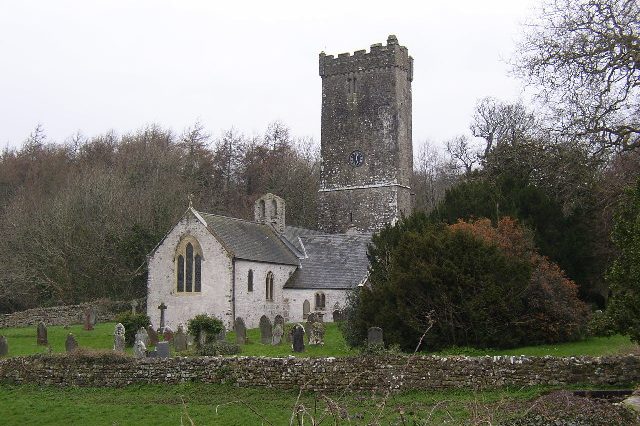
AN APPLICATION for a storage building at a south Pembrokeshire farm, made by a family member of an officer on Pembrokeshire County Council’s planning service, has been given the go-ahead by the authority’s planning committee.
In an application recommended for approval at the July 23 meeting of the authority’s planning committee, Laura Elliot sought permission for the erection of an agricultural storage building at Tedion Farm, a dairy farm near Lawrenny.
The application had been brought to committee, rather than being delegated to planning officers, due to the family connection.
The farm, near to the Pembrokeshire coast National Park border, comprises 270 milking cows and dairy heifer replacements kept on the farm comprising land over 138 hectares. The farm is mainly down to grass and the cows are paddock grazed in order to utilise grass efficiency.
No objections had been received from local community council Martletwy.
A report for members said: “The application seeks consent for the erection of agricultural storage building. The erection of an agricultural building will be used to store stay, hay and farm machinery.
“The building would be located within the existing farm complex, to the north-east of the site, adjacent to the main farm dwelling. The building will measure 18 metres in length by 13.6 metres in width, with a pitched roof height of 5.71 metres.”
Approval was moved by Cllr Alistair Cameron, seconded by Cllr Brian Hall.
Farming
Fears dairy farm near Kilgetty could increase to 3,000 cattle
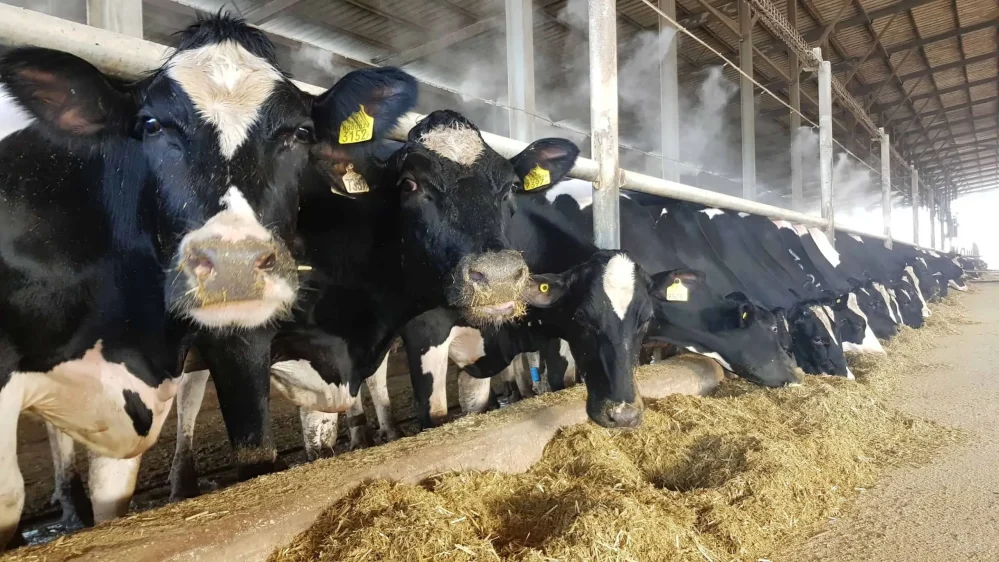
PEMBROKESHIRE planners are to visit the site of one of the county’s largest dairy farms after claims were raised a scheme for new calf buildings could lead to animal welfare issues and an increase in the size of the herd to 3,000 cattle.
At the July 23 meeting of the council’s planning committee, an application by Hugh James of Langdon Mill Farms Ltd for a calf building, weaned calf building, and associated yard areas, at Langdon Mill Farm, near Jeffreyston, Kilgetty was recommended for conditional approval.
Local community council Jeffreyston has raised concerns, made by a member of the public, on potential increased noise and odour from the scheme, planners heard.
A supporting statement, through agent Reading Agricultural Consultants, said: “The holding currently has a milking herd of approximately 2,000 cows, which are housed indoors for the majority of the year, with dry cows [cows that are not lactating, prior to calving] and heifers grazed outdoors when weather and soil conditions permit.
“There has been significant investment in buildings and infrastructure at the farm over the last decade in respect of cattle accommodation, slurry storage, milking facilities, Anaerobic Digestion (AD) plant and feed storage. The unit is efficient, achieving yields of more than 10,000 litres/cow/year, with cows being milked three times/day in the 60-point rotary parlour.”
Currently, calves are reared at Langdon Mill Farm for two months before being transported off-site to be reared at a number of third-party farms in the area before being return later; the proposed 61.2m long calf building is required to accommodate young-stock, following separation from the cows, to two-months, with the 164.8m weaned calf building to be used for calves from two months to seven months.
The application says the proposals would “clearly make the enterprise more financially robust by reducing reliance on third party farms”.
However, concerns were raised at the committee meeting by objector Ian Dennis, a former vet of some four decades’ experience, who described Langdon as occupying 3,000 acres of land with 2,000 cattle currently that “are never allowed to graze,” the proposal, he said, would add another 1,000 cattle to the site.
“This is factory farming, an intensive livestock unit, no longer a farm.”
He told planners a “mendacious and incorrect” ammonia emission report submitted by the applicants was “designed to bamboozle,” saying, despite his experience and scientific background, he needed expert support to assess.
He said only average figures were reported, rather than peaks and troughs, adding the “fictitious anaerobic digestion plant” had yet to be built, with planning permission now lapsed.
However, officers told members the applicant’s agent had said works on the digestor had actually started.
On the issue of animal welfare, Mr Dennis said he had “very huge concerns” about the scale of the development, differing from a planning officer report saying the scheme would bring animal welfare benefits.
A suggestion by committee chair Cllr Simon Hancock the application be deferred pending a site visit was unanimously backed by committee members present.
Farming
Family pay tribute to farmer, 65, who died in quadbike accident
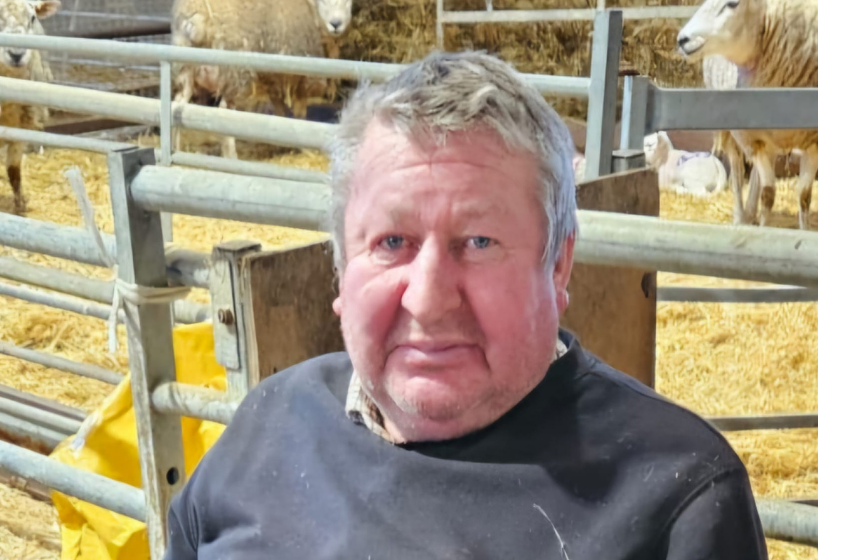
A WEST WALES farmer has died after an incident involving a quadbike.
Dyfed-Powys Police have confirmed they attended a report of an incident involving an agricultural quadbike in a field in the Llanilar area of Aberystwyth on July 17.
The force has confirmed that a 65-year-old man died at the scene.
They said that his next of kin have been advised and are being supported by specialist officers. The HM Coroner and Health and Safety Executives have been informed.
His family have paid tribute to him. The family said: “Hugh Tudor was a 65 year old farmer who had farmed at Tynberllan, Llanilar with his wife Ann for over 40 years. He was a devoted father to Sara, Lowri and the late Gwenno.
“Hugh was the son of the late Tom and Sybil Tudor of Glanystwyth and brother to Richard.
“Farming was his life, but he also had a wide range of interests and was actively involved in all aspects of the local community in Llanilar and beyond.
“We would like to thank everybody for their support and kindness during this difficult time.”
-

 Education5 days ago
Education5 days agoMilford Tesco worker achieves Oxford dream and lands top legal job
-

 Crime4 days ago
Crime4 days agoHaverfordwest man admits having nearly 1000 child and animal images
-

 Crime4 days ago
Crime4 days agoYouth set to appear in court over serious sexual offences
-

 Crime4 days ago
Crime4 days agoPolice investigating after man injured during altercation in cemetery
-

 Education4 days ago
Education4 days agoPupils delight in ice cream treat from Pembrokeshire’s number one van
-

 Crime4 days ago
Crime4 days agoTown centre ‘stinking of skunk’ as police strip cannabis farm
-

 Crime3 days ago
Crime3 days agoFag-butt police court summonses spark debate in Pembrokeshire
-

 News6 days ago
News6 days agoProposal to give firefighters a council tax discount to go to Cabinet













